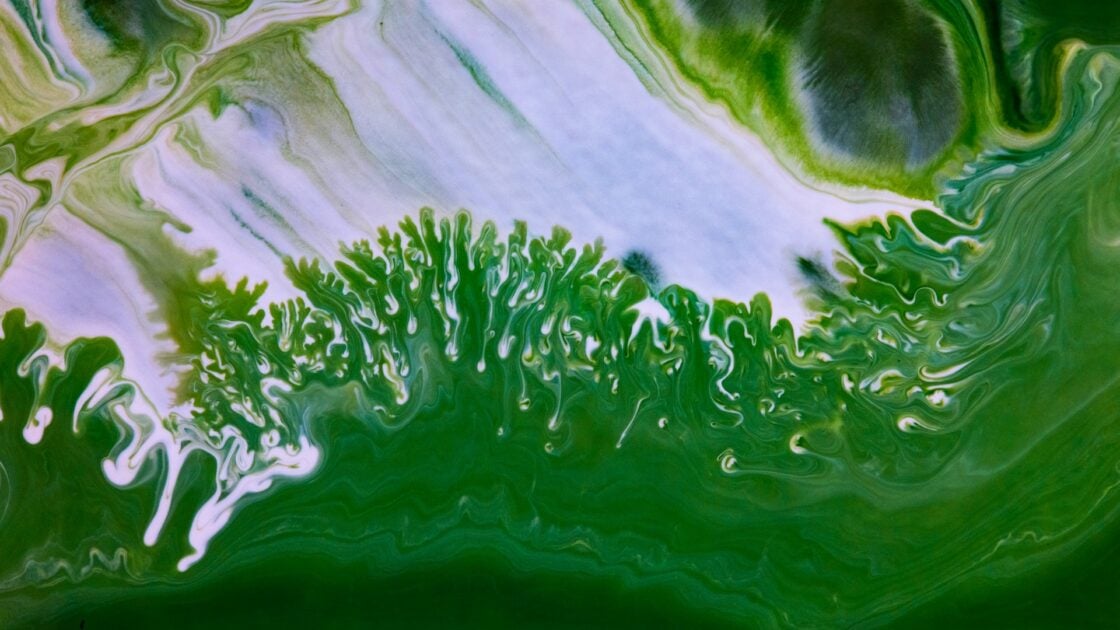
Chlorella benefits have long been known to science, especially its role as a rich source of protein. Chlorella algae, a type of freshwater seaweed or green algae, is one of the top sources of nutriotinal supplements with substantial amounts of vitamins and an excellent source of plant-based complete protein, making it perfect for vegans, vegetarians, or anyone who wants to supplement their plant-based diets with a sustainable protein source. It’s also filled with important amounts of vitamins, minerals, and antioxidant compounds.
Chlorella stands out for its unique nutritional makeup, loads of exciting potential health benefits, its industrial potential for various applications, and, last but not least, its vibrant green color. As a dietary supplement, chlorella is taken in various forms, including powders and tablets, to boost nutrient intake. Keep reading to find out why you need chlorella in your life ASAP. Our fearless leader and founder, Laura Klein, takes chlorella daily for its energy (think B12) and detox support. Spoiler alert: our favorite greens powder, which includes chlorella, is Ora Organic’s Easy Being Greens Super Greens Powder, available in our Organic Authority shop.
Btw, if you’re looking to add even more green goodness to your diet for nutritional support (and we believe you totally should be), get the low down on the 5 best greens powders (dietitian approved), why you should add wheatgrass to your wellness routine, and how to get the mega health benefits of spirulina.
Want more top picks? Sign up for the newsletter for more well-researched wellness advice.
Here’s Why You Should be Taking Chlorella
We’ve reviewed the studies—chlorella is a beast! Here’s why.
What Is Chlorella Vulgaris?
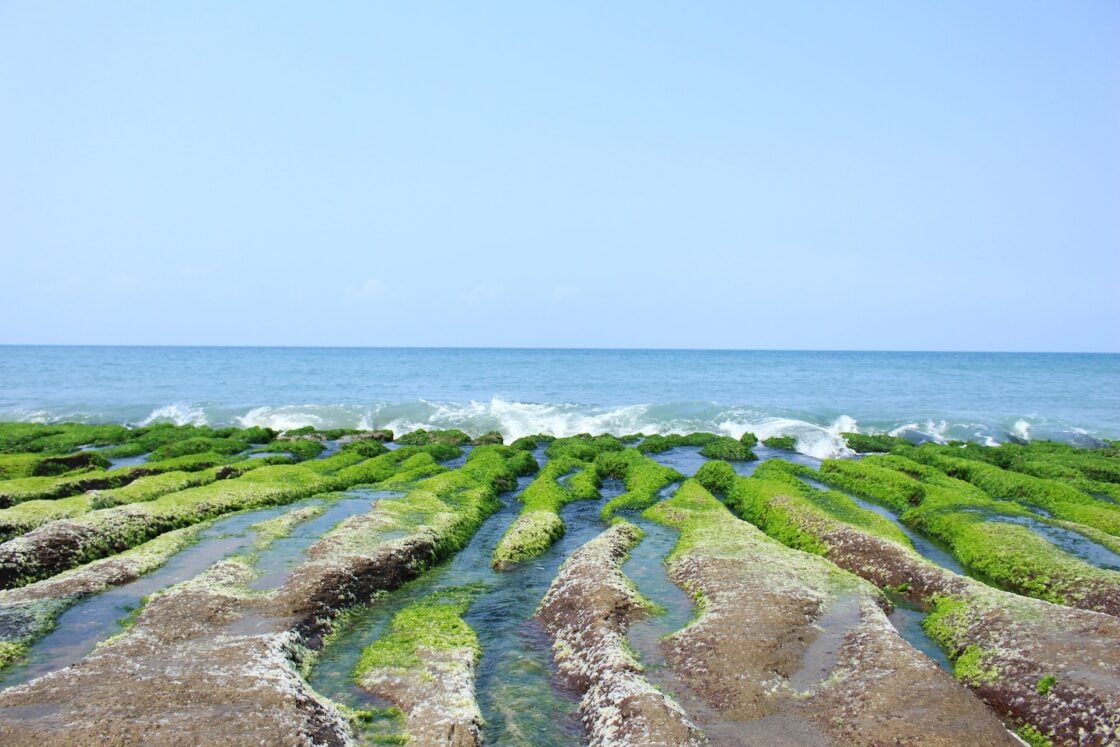
Chlorella is an incredibly nutritious freshwater algae that is native to Japan and Taiwan commonly used for human consumption. It’s unicellular, and is a lovely green color due to its chlorophyll content, a quality it shares with sea vegetables, such as seaweed.
Because we can’t digest it as-is, chlorella ingestion is taken as a supplement in tablet, capsule, or powder form. This makes it easy for almost anyone to add chlorella to their daily routine. Chlorella supplements typically contain chlorella vulgaris or chlorella pyrenoidosa 1, known for their diverse pharmacological activities.
Chlorella is full of nutrients, which is the main reason many healthy adults include it as a daily nutritional supplement.
Nutritional and Health Benefits of Chlorella
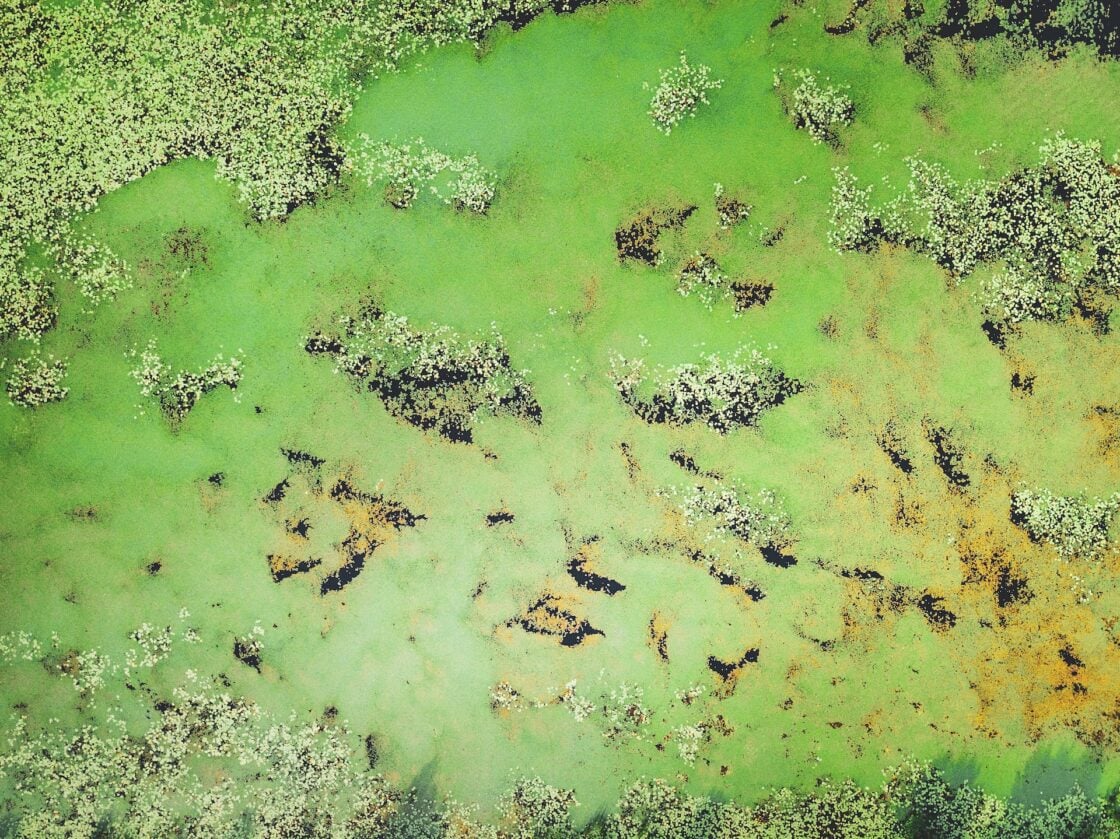
Over half of chlorella is made up of complete, absorbable protein (about 60 percent of it, to be exact) that also contains all 9 essential amino acids. What’s more, chlorella boasts an excellent ratio of omega-3 fatty acids to omega-6 fatty acids and a good helping of carbohydrates, too.
Now to the nuts and bolts. One hundred grams of dried chlorella generally contains:
- Protein: 58 g
- Fat: 9 g
- Carbohydrates: 23 g
- Vitamin A: 51,300 IU (1026%DV)
- Iron: 130 mg (722%DV)
- Zinc: 71 mg (473%DV)
- Riboflavin: 4.3 mg (253%DV)
- Niacin: 23.8 mg (119%DV)
- Thiamin: 1.7 mg (113%DV)
- Magnesium: 315 mg (79% DV)
- Vitamin B6: 1.4 mg (70%DV)
- Folate: 84 mcg (24%DV)
- Calcium: 221 mg (22%DV)
- Vitamin C: 10.4 mg (17%DV)
- Vitamin B12: 0.1 mcg (2%DV)
Chlorella contains 1-4% chlorophyll, 9-18% fiber, and is one of the few plant-based absorbable sources of vitamin B12. Its high iron content can help prevent iron deficiency anemia. The protein content in chlorella is significant, making it a rich dietary source of nutrients for those on a vegan diet.
How to Use Chlorella

When it comes to actually taking chlorella supplements, some forms have a fairly strong taste. You may want to add powdered chlorella to a morning green smoothie like our favorite Chocolate Mint Shake (it’s a smoothie but it tastes like a shake! Watch the video on how to make it) to avoid an aftertaste. Capsules can easily be taken with water, or some brands make a drink powder that includes other taste-improving ingredients—for example, Ora Organic’s “Easy Being Green” Greens Powder comes in an orange flavor and also includes powerful adaptogenic herbs like ashwagandha and triphala.
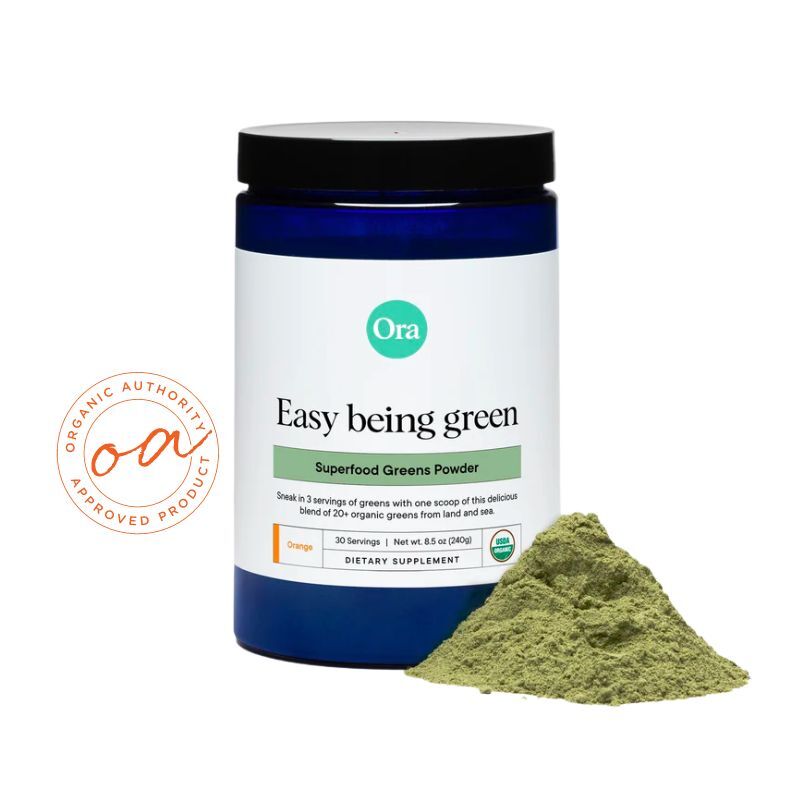
Can You Take Chlorella Every Day?
There isn’t a standard dose for chlorella, but a range of 6-10 grams per day seems to be the most typical. Higher doses than this haven’t been researched, and you probably don’t want to be the guinea pig.
You can take chlorella every day. In fact, that’s pretty much the point! But talk with your healthcare provider before getting started to find the best dose for you.
Chlorella Benefits: What does it do to your body?
There’s no question that chlorella is a very nutrient-dense organism that serves the body well, but some nutritional benefits attributed to it seem beyond the realm of possibility. That said, certain chlorella benefits have been proven by science. Chlorella can help lower blood glucose levels and improve insulin sensitivity. It can also help with different form of heart disease; lower high blood pressure, including both systolic and diastolic blood pressure. Additionally, chlorella can help reduce serum total cholesterol levels and improve natural killer cell activity, supporting a healthy immune system.

1. Detoxification
Chlorella won’t detox your body after vacation (that’s what your liver and kidneys are for), but it may be able to help with liver health in other ways. Some studies suggest that chlorella supplementation may support liver function and potentially improve liver enzymes. If you eat a lot of fish that contain heavy metals or fruits and veggies with pesticide residues, It can help eliminate them from your body, reducing oxidative damage and supporting human health. Studies also show chlorella’s role in dioxin excretion, further aiding in detoxification.
However, more research is needed to fully understand the beneficial effects of chlorella on liver health and its potential benefits for detoxification processes. It’s also important to note that chlorella may interact with certain medications, including blood sugar lowering medications, so consult with a healthcare professional before adding chlorella to your regimen, especially if you have existing liver conditions or are taking medications that affect liver function.
Although it’s not well-documented in human trials, chlorella supplementation has been shown to decrease mercury levels in mice. In one pilot study, streptozotocin-induced diabetic mice with mercury in their tissues were given diets with 0%, 5%, or 10% chlorella powder. By the end of the 21-day study, the mice given chlorella had significantly lower levels of mercury in their blood and tissues.
A different study looking at agricultural insecticides showed that chlorella was able to remove a high rate (94%) of diazinon, a popular insecticide. Chlorella was found to tolerate the insecticide well and researchers believed that the freshwater algae could play a role in toxin removal on a larger scale.
2. Better Immune System
Chlorella supplements may be used to naturally support the immune system by increasing the activity of peripheral blood cells such as natural killer cells. something we could all use these days.
In one double-blinded, randomized, placebo-controlled study, people who supplemented with chlorella over an eight weeks period had increased activity in their natural killer cells. Natural killer cells are basically what they sound like, cells that kill off harmful bacteria that could cause infections and diseases.
3. Lower Cholesterol
Chlorella’s ability to improve serum cholesterol levels has been proven in several clinical studies. It can help maintain both total cholesterol and low-density lipoprotein cholesterol levels in the blood. Additionally, it can help manage high-density lipoprotein cholesterol levels, which is beneficial for overall cardiovascular health.
In one of these, hypercholesterolemic subjects with mild hypercholesterolemia, or high cholesterol, were randomly assigned to receive either 5 g/day of chlorella or placebo. At the end of the study, those who took chlorella had significantly improved total cholesterol, lipid profile, and triglyceride levels. Researchers believed the results were due to the carotenoids in chlorella.
A different study on the subject asked participants to take either 5 g of chlorella or a placebo at the same time as 3 eggs (the three-egg diet), each containing 187 mg of cholesterol. What they learned at the end of the 4-week study was that taking chlorella along with a cholesterol-heavy meal helped maintain both total cholesterol and low density lipoprotein cholesterol (LDL cholesterol) levels in the blood. On the flip side, those taking the placebo had increased total cholesterol and LDL cholesterol levels after eating 3 eggs a day for 4 weeks (and they probably never ate eggs again).
Chlorella shows promise in managing cardiovascular risk factors. Studies demonstrate its ability to lower systolic and diastolic blood pressure, reduce serum total cholesterol levels, and improve arterial stiffness. These benefits are particularly valuable for hypercholesterolemic adults and borderline diabetics. By incorporating chlorella into their diet, individuals may effectively manage blood pressure and cholesterol levels, supporting overall cardiovascular health. This makes chlorella a potentially powerful ally for those seeking to improve their heart health naturally.
4. Improve Blood Sugar
If you Google “benefits of chlorella,” you’ll most likely read that in some human studies has shown that can help improve fasting blood glucose levels, more research is needed. However, it has shown potential in improving glycemic control.
Much of the supporting evidence has been conducted on animal models rather than humans. However, we do have some good studies that used people.
In one of these human trials, disease patients with non-alcoholic fatty liver disease took either placebo or 4 tablets a day of 300 mg of chlorella. At the end of the 8-week trial, those who took chlorella were found to have improved blood sugar status.
But, as previously mentioned, not all research has shown chlorella can improve blood sugar levels. A study from 2021 found that chlorella supplementation did not result in significant improvements in blood sugar levels. It is worth noting that participants took 1500 mg of chlorella a day, which is quite a bit less than other studies.
Chlorella has shown potential in improving insulin signaling and glycemic control, which is beneficial for both healthy subjects and those with borderline diabetes. While more research is needed, some studies have indicated chlorella’s hypoglycemic effects could help manage blood sugar levels.
5. Anti-Aging Effects
Chlorella is known to contain more than one type of antioxidant, like chlorophyll, beta-carotene, and vitamin C, which are active compounds that help combat oxidative stress and promote anti-aging benefits. These antioxidant activities are vital in reducing oxidative damage, contributing to healthier skin and overall well-being.
Oxidative stress occurs when there is an imbalance between reactive oxygen species, or free radicals, and the antioxidants that are needed to get rid of them. When it comes to aging, oxidative stress is a major culprit.
To test how chlorella can benefit the natural process of aging, many studies have looked into chlorella’s effect on oxidative stress.
One study that was conducted on chronic cigarette smokers—notorious for having high levels of oxidative stress—found that six weeks of chlorella supplementation (3,600 mg a day) improved antioxidant status in the body.
Results from a different study conducted on mice suggested that chlorella supplementation over the long-term may prevent age-related muscle atrophy.
6. Wound Healing
For a long time, chlorella has been used in traditional medicine for its wide range of nutrients thought to treat inflammatory response. These same nutrients may also be able to improve the wound healing process. The bioactive compounds in chlorella aid in reducing inflammation and promoting faster recovery.
An animal study from 2014 found that higher doses of both oral and topical chlorella significantly improved skin inflammation, the overall healing process, and the duration of wound healing. Researchers suggested that either oral or topical chlorella could be used to treat wounds.
In another more recent animal study, rats with diabetic wounds were treated with either placebo or 50 g/kg a day of chlorella for 21 days. At the end of the study, the wounds were healed 100% in the chlorella group, but not so much in the placebo group.
7. Cancer Prevention
Although chlorella isn’t likely to cure cancer (if only it were that simple), various chlorella species have been found to have potential antitumor activity, most likely due to their antioxidant contents. Additionally, chlorella intake has been shown to improve natural killer cell activity, as studied by researchers from Yonsei University, supporting a healthy immune system response and immunomyelopoietic activity.
These results have mostly been found in lab and animal studies, preliminary research on chlorella’s antitumor activity has shown promising results, especially in animal studies involving tumor-bearing mice, which we can learn from, but more human trials need to be done. However, more research is needed, including Cancer Immunol studies. Some studies have also shown chlorella’s impact on reducing lipid peroxidation, which is linked to cancer prevention.
We do have some data from human research. One small study found chlorella granules and extract could be used to improve the quality of life for patients with breast cancer. Participants reported improvements in cancer-related side effects like fatigue and dry skin.
It should be noted that no supplement, including chlorella, should replace necessary medical treatments. Although chlorella may be able to support and improve certain conditions, it should be used in conjunction with medicines and other treatments recommended by your healthcare provider
9. Chlorella’s Role in Eye Health
The high levels of vitamin A and other antioxidants in chlorella contribute to maintaining healthy vision and eye health. These antioxidants combat oxidative stress, which can damage the eyes over time, particularly in conditions like macular degeneration.
10. Impact on Blood Clotting and Risk of Anemia
Chlorella contains vitamin K, which plays a vital role in blood clotting, reducing the risk of excessive bleeding. Additionally, the high iron content in chlorella helps prevent iron deficiency anemia, making it an excellent supplement for those at risk of anemia.
11. Chlorella for Physical Stamina and Body Weight Management
Chlorella’s nutrient-dense profile, including complete protein and essential vitamins, supports physical stamina and overall energy levels. Additionally, its role in promoting a healthy metabolism can aid in body weight management, making it a valuable addition to a fitness routine.
Does Chlorella Have Side Effects?

There’s always a chance of side effects when taking a new medication or supplement. Although uncommon, chlorella can cause common side effects like:21
- Nausea
- Diarrhea
- Abdominal cramping
- Gas
- Green stools
There have also been some reports of asthma, anaphylaxis, photosensitivity reactions, and allergic reaction associated with taking chlorella, but these are rare.
It should also be noted that some medications can interact with chlorella. Chlorella contains vitamin K, a nutrient content that affects blood clotting. Because of this, chlorella could reduce the effectiveness of warfarin. People taking warfarin and other blood thinners should talk with a healthcare provider before taking chlorella, as the two may interact.21
The best way to avoid side effects and other issues when taking chlorella is to simply use it as directed and not take more than you should.
Which Is Better, Chlorella or Spirulina?

You may have heard all the rage about spirulina and wonder how chlorella compares. The two are definitely similar but have a few key differences.
Chlorella is often compared to spirulina, a related type of blue-green algae. Both algae contain a wide range of excelent sources of nutrients that are known to be beneficial in many ways.
In terms of nutrition, the two algae are similar in protein, carbs, and fat. Chlorella contains quite a bit more vitamin A, iron, and zinc than spirulina making it a superior choice for those needing these essential vitamins, while spirulina contains a bit more thiamine and fewer calories.
Both chlorella and spirulina have been linked to a number of health benefits ranging from cardiovascular health to blood sugar control. They also both contain antioxidants and good sources of plant-based protein.
So, which one comes out on top?
Either algae is a good choice, but chlorella may take the cake. Chlorella contains more healthy fats, like anti-inflammatory omega-3s, compared to spirulina. It also has higher amounts of essential nutrients like iron and vitamin A, a powerful antioxidant.
Ultimately, the choice is yours! You can’t really go wrong. It’s a good idea to try each and choose your favorite, or find a product that includes both chlorella and spirulina.
Does Chlorella Make You Poop?

It happens to the best of us—sometimes, we need a little help in the “BM” department. Chlorella may be the answer to your bathroom woes.
Chlorella contains fiber, which can aid in fecal excretion, the king (or queen?) of normal digestion and bowel movements. Most of the time, when you’re having trouble going number two, fiber will ease your worries. Literally.
There are two types of fiber, and both can help you go poop. Soluble fiber, found in foods like apples, oats, and potatoes, adds bulk to your stools. Insoluble fiber, which is found in chlorella, acts like a brush inside your intestines, pulling debris (foodstuff) out for excretion.
So, because chlorella contains insoluble fiber, it should, in theory, help you poop. However, a normal dose of chlorella contains less than 1 gram of fiber. This means you would need to use a lot of chlorella to reap the benefits.
Instead, work towards adding both soluble and insoluble fiber to your diet in other ways while also taking chlorella. And don’t forget hydration, another key element to normal bowel movements.
How to Pick the Best Chlorella Powder

The nutritional content of chlorella products can vary widely depending on how the algae was grown and processed, so plan on doing a bit of research on brands you’re interested in.
Previous investigations on some chlorella products have revealed that protein values can vary, from as low as seven percent to as high as 88 percent.
There are three species of chlorella: vulgaris, yaeyama, and pyrenoidosa.
Vulgaris is usually grown in tanks without sunlight and contains less chlorophyll and nutrients than other species. However, it is easier to absorb, so it tends to be a better choice if you have a sensitive stomach. Yaeyama is a subspecies that is generally considered clean, since it is typically grown indoors. And pyrenoidosa contains more nutrients and chlorophyll than the others, but is generally grown outdoors, which poses a risk for contamination.
Chlorella varies widely in quality based upon where it is sourced, so it’s important to do your research.
For example, Chinese-produced chlorella has historically posed problems for consumers. Hainan Island, where much of the country’s chlorella is grown, is so polluted that in 2016, 35 tons of fish washed up on the island’s shores. And in 2015, a batch of organic chlorella being exported to Europe was found to contain benzoapyrene, a carcinogenic polycyclic aromatic hydrocarbon.
While some worry about radiation exposure, Japanese chlorella is generally considered to be a clean option, given the strict limits for heavy metals and bacteria set by the Japanese government, making it safe for human consumption. Japanese companies have also manufactured chlorella longer than any other country. They’ve developed many of the techniques used to process chlorella for consumption, including techniques to break down the cellular wall, a crucial step that ensures we can absorb all of its benefits.
South Korea and Taiwan are also known to have safe practices surrounding chlorella production.
Ora Organic’s Easy Being Green Superfood Powder

With this information in mind, if you want a greens powder that contains chlorella you can shop Ora Organic’s Easy Being Green Superfood Powder in the Organic Authority Shop. They source their organic chlorella from Japan and Taiwan. Our team has awarded Ora Organic the Organic Authority Approved seal because of their transparent practices and the purity of their products—trust us, we’ve tested a ton of greens powders!
HealthForce Chlorella Manna
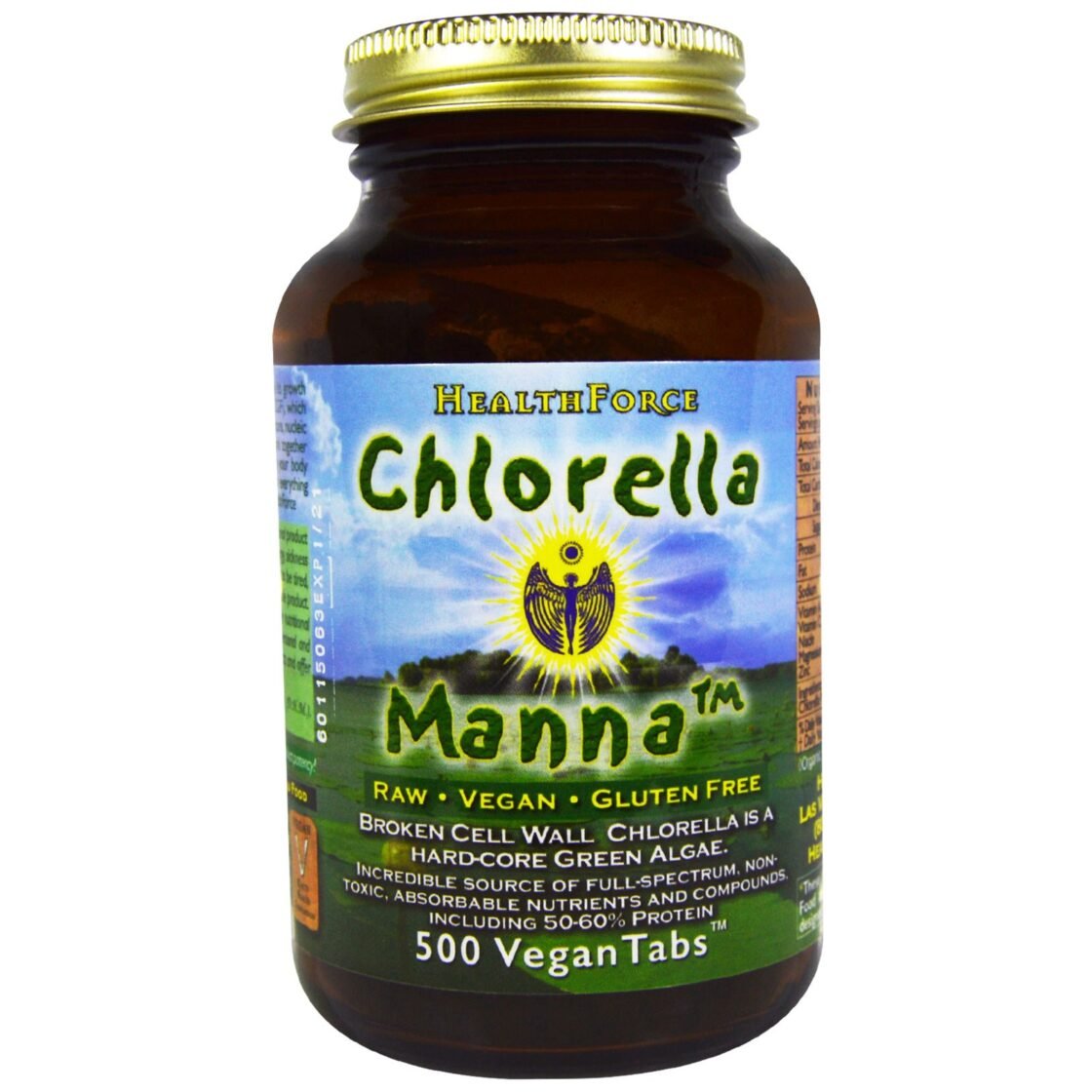
Chlorella benefits have long been known to science, especially its role as a rich source of protein. Chlorella algae, a type of freshwater seaweed or green algae, is one of the top sources of nutriotinal supplements with substantial amounts of vitamins and an excellent source of plant-based complete protein, making it perfect for vegans, vegetarians, or anyone who wants to supplement their plant-based diets with a sustainable protein source. It’s also filled with important amounts of vitamins, minerals, and antioxidant compounds.
Chlorella stands out for its unique nutritional makeup, loads of exciting potential health benefits, its industrial potential for various applications, and, last but not least, its vibrant green color. As a dietary supplement, chlorella is taken in various forms, including powders and tablets, to boost nutrient intake. Keep reading to find out why you need chlorella in your life ASAP. Our fearless leader and founder, Laura Klein, takes chlorella daily for its energy (think B12) and detox support. Spoiler alert: our favorite greens powder, which includes chlorella, is Ora Organic’s Easy Being Greens Super Greens Powder, available in our Organic Authority shop.
Btw, if you’re looking to add even more green goodness to your diet for nutritional support (and we believe you totally should be), get the low down on the 5 best greens powders (dietitian approved), why you should add wheatgrass to your wellness routine, and how to get the mega health benefits of spirulina.
Want more top picks? Sign up for the newsletter for more well-researched wellness advice.
Here’s Why You Should be Taking Chlorella
We’ve reviewed the studies—chlorella is a beast! Here’s why.
What Is Chlorella Vulgaris?

Chlorella is an incredibly nutritious freshwater algae that is native to Japan and Taiwan commonly used for human consumption. It’s unicellular, and is a lovely green color due to its chlorophyll content, a quality it shares with sea vegetables, such as seaweed.
Because we can’t digest it as-is, chlorella ingestion is taken as a supplement in tablet, capsule, or powder form. This makes it easy for almost anyone to add chlorella to their daily routine. Chlorella supplements typically contain chlorella vulgaris or chlorella pyrenoidosa 1, known for their diverse pharmacological activities.
Chlorella is full of nutrients, which is the main reason many healthy adults include it as a daily nutritional supplement.
Nutritional and Health Benefits of Chlorella

Over half of chlorella is made up of complete, absorbable protein (about 60 percent of it, to be exact) that also contains all 9 essential amino acids. What’s more, chlorella boasts an excellent ratio of omega-3 fatty acids to omega-6 fatty acids and a good helping of carbohydrates, too.
Now to the nuts and bolts. One hundred grams of dried chlorella generally contains:
- Protein: 58 g
- Fat: 9 g
- Carbohydrates: 23 g
- Vitamin A: 51,300 IU (1026%DV)
- Iron: 130 mg (722%DV)
- Zinc: 71 mg (473%DV)
- Riboflavin: 4.3 mg (253%DV)
- Niacin: 23.8 mg (119%DV)
- Thiamin: 1.7 mg (113%DV)
- Magnesium: 315 mg (79% DV)
- Vitamin B6: 1.4 mg (70%DV)
- Folate: 84 mcg (24%DV)
- Calcium: 221 mg (22%DV)
- Vitamin C: 10.4 mg (17%DV)
- Vitamin B12: 0.1 mcg (2%DV)
Chlorella contains 1-4% chlorophyll, 9-18% fiber, and is one of the few plant-based absorbable sources of vitamin B12. Its high iron content can help prevent iron deficiency anemia. The protein content in chlorella is significant, making it a rich dietary source of nutrients for those on a vegan diet.
How to Use Chlorella

When it comes to actually taking chlorella supplements, some forms have a fairly strong taste. You may want to add powdered chlorella to a morning green smoothie like our favorite Chocolate Mint Shake (it’s a smoothie but it tastes like a shake! Watch the video on how to make it) to avoid an aftertaste. Capsules can easily be taken with water, or some brands make a drink powder that includes other taste-improving ingredients—for example, Ora Organic’s “Easy Being Green” Greens Powder comes in an orange flavor and also includes powerful adaptogenic herbs like ashwagandha and triphala.

Ora Organic’s Easy Being Green contains chlorella and Ayurvedic herbs to support overall well being. It does not contain any artificial flavors, colors, sweeteners or preservatives.
Can You Take Chlorella Every Day?
There isn’t a standard dose for chlorella, but a range of 6-10 grams per day seems to be the most typical. Higher doses than this haven’t been researched, and you probably don’t want to be the guinea pig.
You can take chlorella every day. In fact, that’s pretty much the point! But talk with your healthcare provider before getting started to find the best dose for you.
Chlorella Benefits: What does it do to your body?
There’s no question that chlorella is a very nutrient-dense organism that serves the body well, but some nutritional benefits attributed to it seem beyond the realm of possibility. That said, certain chlorella benefits have been proven by science. Chlorella can help lower blood glucose levels and improve insulin sensitivity. It can also help with different form of heart disease; lower high blood pressure, including both systolic and diastolic blood pressure. Additionally, chlorella can help reduce serum total cholesterol levels and improve natural killer cell activity, supporting a healthy immune system.

There’s always room for more research, but chlorella has been fairly well studied and there are known, proven benefits of taking a chlorella supplement. –
1. Detoxification
Chlorella won’t detox your body after vacation (that’s what your liver and kidneys are for), but it may be able to help with liver health in other ways. Some studies suggest that chlorella supplementation may support liver function and potentially improve liver enzymes. If you eat a lot of fish that contain heavy metals or fruits and veggies with pesticide residues, It can help eliminate them from your body, reducing oxidative damage and supporting human health. Studies also show chlorella’s role in dioxin excretion, further aiding in detoxification.
However, more research is needed to fully understand the beneficial effects of chlorella on liver health and its potential benefits for detoxification processes. It’s also important to note that chlorella may interact with certain medications, including blood sugar lowering medications, so consult with a healthcare professional before adding chlorella to your regimen, especially if you have existing liver conditions or are taking medications that affect liver function.
Although it’s not well-documented in human trials, chlorella supplementation has been shown to decrease mercury levels in mice. In one pilot study, streptozotocin-induced diabetic mice with mercury in their tissues were given diets with 0%, 5%, or 10% chlorella powder. By the end of the 21-day study, the mice given chlorella had significantly lower levels of mercury in their blood and tissues.
A different study looking at agricultural insecticides showed that chlorella was able to remove a high rate (94%) of diazinon, a popular insecticide. Chlorella was found to tolerate the insecticide well and researchers believed that the freshwater algae could play a role in toxin removal on a larger scale.
2. Better Immune System
Chlorella supplements may be used to naturally support the immune system by increasing the activity of peripheral blood cells such as natural killer cells. something we could all use these days.
In one double-blinded, randomized, placebo-controlled study, people who supplemented with chlorella over an eight weeks period had increased activity in their natural killer cells. Natural killer cells are basically what they sound like, cells that kill off harmful bacteria that could cause infections and diseases.
3. Lower Cholesterol
Chlorella’s ability to improve serum cholesterol levels has been proven in several clinical studies. It can help maintain both total cholesterol and low-density lipoprotein cholesterol levels in the blood. Additionally, it can help manage high-density lipoprotein cholesterol levels, which is beneficial for overall cardiovascular health.
In one of these, hypercholesterolemic subjects with mild hypercholesterolemia, or high cholesterol, were randomly assigned to receive either 5 g/day of chlorella or placebo. At the end of the study, those who took chlorella had significantly improved total cholesterol, lipid profile, and triglyceride levels. Researchers believed the results were due to the carotenoids in chlorella.
A different study on the subject asked participants to take either 5 g of chlorella or a placebo at the same time as 3 eggs (the three-egg diet), each containing 187 mg of cholesterol. What they learned at the end of the 4-week study was that taking chlorella along with a cholesterol-heavy meal helped maintain both total cholesterol and low density lipoprotein cholesterol (LDL cholesterol) levels in the blood. On the flip side, those taking the placebo had increased total cholesterol and LDL cholesterol levels after eating 3 eggs a day for 4 weeks (and they probably never ate eggs again).
Chlorella shows promise in managing cardiovascular risk factors. Studies demonstrate its ability to lower systolic and diastolic blood pressure, reduce serum total cholesterol levels, and improve arterial stiffness. These benefits are particularly valuable for hypercholesterolemic adults and borderline diabetics. By incorporating chlorella into their diet, individuals may effectively manage blood pressure and cholesterol levels, supporting overall cardiovascular health. This makes chlorella a potentially powerful ally for those seeking to improve their heart health naturally.
4. Improve Blood Sugar
If you Google “benefits of chlorella,” you’ll most likely read that in some human studies has shown that can help improve fasting blood glucose levels, more research is needed. However, it has shown potential in improving glycemic control.
Much of the supporting evidence has been conducted on animal models rather than humans. However, we do have some good studies that used people.
In one of these human trials, disease patients with non-alcoholic fatty liver disease took either placebo or 4 tablets a day of 300 mg of chlorella. At the end of the 8-week trial, those who took chlorella were found to have improved blood sugar status.
But, as previously mentioned, not all research has shown chlorella can improve blood sugar levels. A study from 2021 found that chlorella supplementation did not result in significant improvements in blood sugar levels. It is worth noting that participants took 1500 mg of chlorella a day, which is quite a bit less than other studies.
Chlorella has shown potential in improving insulin signaling and glycemic control, which is beneficial for both healthy subjects and those with borderline diabetes. While more research is needed, some studies have indicated chlorella’s hypoglycemic effects could help manage blood sugar levels.
5. Anti-Aging Effects
Chlorella is known to contain more than one type of antioxidant, like chlorophyll, beta-carotene, and vitamin C, which are active compounds that help combat oxidative stress and promote anti-aging benefits. These antioxidant activities are vital in reducing oxidative damage, contributing to healthier skin and overall well-being.
Oxidative stress occurs when there is an imbalance between reactive oxygen species, or free radicals, and the antioxidants that are needed to get rid of them. When it comes to aging, oxidative stress is a major culprit.
To test how chlorella can benefit the natural process of aging, many studies have looked into chlorella’s effect on oxidative stress.
One study that was conducted on chronic cigarette smokers—notorious for having high levels of oxidative stress—found that six weeks of chlorella supplementation (3,600 mg a day) improved antioxidant status in the body.
Results from a different study conducted on mice suggested that chlorella supplementation over the long-term may prevent age-related muscle atrophy.
6. Wound Healing
For a long time, chlorella has been used in traditional medicine for its wide range of nutrients thought to treat inflammatory response. These same nutrients may also be able to improve the wound healing process. The bioactive compounds in chlorella aid in reducing inflammation and promoting faster recovery.
An animal study from 2014 found that higher doses of both oral and topical chlorella significantly improved skin inflammation, the overall healing process, and the duration of wound healing. Researchers suggested that either oral or topical chlorella could be used to treat wounds.
In another more recent animal study, rats with diabetic wounds were treated with either placebo or 50 g/kg a day of chlorella for 21 days. At the end of the study, the wounds were healed 100% in the chlorella group, but not so much in the placebo group.
7. Cancer Prevention
Although chlorella isn’t likely to cure cancer (if only it were that simple), various chlorella species have been found to have potential antitumor activity, most likely due to their antioxidant contents. Additionally, chlorella intake has been shown to improve natural killer cell activity, as studied by researchers from Yonsei University, supporting a healthy immune system response and immunomyelopoietic activity.
These results have mostly been found in lab and animal studies, preliminary research on chlorella’s antitumor activity has shown promising results, especially in animal studies involving tumor-bearing mice, which we can learn from, but more human trials need to be done. However, more research is needed, including Cancer Immunol studies. Some studies have also shown chlorella’s impact on reducing lipid peroxidation, which is linked to cancer prevention.
We do have some data from human research. One small study found chlorella granules and extract could be used to improve the quality of life for patients with breast cancer. Participants reported improvements in cancer-related side effects like fatigue and dry skin.
It should be noted that no supplement, including chlorella, should replace necessary medical treatments. Although chlorella may be able to support and improve certain conditions, it should be used in conjunction with medicines and other treatments recommended by your healthcare provider
9. Chlorella’s Role in Eye Health
The high levels of vitamin A and other antioxidants in chlorella contribute to maintaining healthy vision and eye health. These antioxidants combat oxidative stress, which can damage the eyes over time, particularly in conditions like macular degeneration.
10. Impact on Blood Clotting and Risk of Anemia
Chlorella contains vitamin K, which plays a vital role in blood clotting, reducing the risk of excessive bleeding. Additionally, the high iron content in chlorella helps prevent iron deficiency anemia, making it an excellent supplement for those at risk of anemia.
11. Chlorella for Physical Stamina and Body Weight Management
Chlorella’s nutrient-dense profile, including complete protein and essential vitamins, supports physical stamina and overall energy levels. Additionally, its role in promoting a healthy metabolism can aid in body weight management, making it a valuable addition to a fitness routine.
Does Chlorella Have Side Effects?

There’s always a chance of side effects when taking a new medication or supplement. Although uncommon, chlorella can cause common side effects like:21
- Nausea
- Diarrhea
- Abdominal cramping
- Gas
- Green stools
There have also been some reports of asthma, anaphylaxis, photosensitivity reactions, and allergic reaction associated with taking chlorella, but these are rare.
It should also be noted that some medications can interact with chlorella. Chlorella contains vitamin K, a nutrient content that affects blood clotting. Because of this, chlorella could reduce the effectiveness of warfarin. People taking warfarin and other blood thinners should talk with a healthcare provider before taking chlorella, as the two may interact.21
The best way to avoid side effects and other issues when taking chlorella is to simply use it as directed and not take more than you should.
Which Is Better, Chlorella or Spirulina?

You may have heard all the rage about spirulina and wonder how chlorella compares. The two are definitely similar but have a few key differences.
Chlorella is often compared to spirulina, a related type of blue-green algae. Both algae contain a wide range of excelent sources of nutrients that are known to be beneficial in many ways.
In terms of nutrition, the two algae are similar in protein, carbs, and fat. Chlorella contains quite a bit more vitamin A, iron, and zinc than spirulina making it a superior choice for those needing these essential vitamins, while spirulina contains a bit more thiamine and fewer calories.
Both chlorella and spirulina have been linked to a number of health benefits ranging from cardiovascular health to blood sugar control. They also both contain antioxidants and good sources of plant-based protein.
So, which one comes out on top?
Either algae is a good choice, but chlorella may take the cake. Chlorella contains more healthy fats, like anti-inflammatory omega-3s, compared to spirulina. It also has higher amounts of essential nutrients like iron and vitamin A, a powerful antioxidant.
Ultimately, the choice is yours! You can’t really go wrong. It’s a good idea to try each and choose your favorite, or find a product that includes both chlorella and spirulina.
Does Chlorella Make You Poop?

It happens to the best of us—sometimes, we need a little help in the “BM” department. Chlorella may be the answer to your bathroom woes.
Chlorella contains fiber, which can aid in fecal excretion, the king (or queen?) of normal digestion and bowel movements. Most of the time, when you’re having trouble going number two, fiber will ease your worries. Literally.
There are two types of fiber, and both can help you go poop. Soluble fiber, found in foods like apples, oats, and potatoes, adds bulk to your stools. Insoluble fiber, which is found in chlorella, acts like a brush inside your intestines, pulling debris (foodstuff) out for excretion.
So, because chlorella contains insoluble fiber, it should, in theory, help you poop. However, a normal dose of chlorella contains less than 1 gram of fiber. This means you would need to use a lot of chlorella to reap the benefits.
Instead, work towards adding both soluble and insoluble fiber to your diet in other ways while also taking chlorella. And don’t forget hydration, another key element to normal bowel movements.
How to Pick the Best Chlorella Powder

The nutritional content of chlorella products can vary widely depending on how the algae was grown and processed, so plan on doing a bit of research on brands you’re interested in.
Previous investigations on some chlorella products have revealed that protein values can vary, from as low as seven percent to as high as 88 percent.
There are three species of chlorella: vulgaris, yaeyama, and pyrenoidosa.
Vulgaris is usually grown in tanks without sunlight and contains less chlorophyll and nutrients than other species. However, it is easier to absorb, so it tends to be a better choice if you have a sensitive stomach. Yaeyama is a subspecies that is generally considered clean, since it is typically grown indoors. And pyrenoidosa contains more nutrients and chlorophyll than the others, but is generally grown outdoors, which poses a risk for contamination.
Chlorella varies widely in quality based upon where it is sourced, so it’s important to do your research.
For example, Chinese-produced chlorella has historically posed problems for consumers. Hainan Island, where much of the country’s chlorella is grown, is so polluted that in 2016, 35 tons of fish washed up on the island’s shores. And in 2015, a batch of organic chlorella being exported to Europe was found to contain benzoapyrene, a carcinogenic polycyclic aromatic hydrocarbon.
While some worry about radiation exposure, Japanese chlorella is generally considered to be a clean option, given the strict limits for heavy metals and bacteria set by the Japanese government, making it safe for human consumption. Japanese companies have also manufactured chlorella longer than any other country. They’ve developed many of the techniques used to process chlorella for consumption, including techniques to break down the cellular wall, a crucial step that ensures we can absorb all of its benefits.
South Korea and Taiwan are also known to have safe practices surrounding chlorella production.
Ora Organic’s Easy Being Green Superfood Powder

Ora Organic’s Easy Being Green Superfood Greens Powder is one of our favorite picks for your source of chlorella.
With this information in mind, if you want a greens powder that contains chlorella you can shop Ora Organic’s Easy Being Green Superfood Powder in the Organic Authority Shop. They source their organic chlorella from Japan and Taiwan. Our team has awarded Ora Organic the Organic Authority Approved seal because of their transparent practices and the purity of their products—trust us, we’ve tested a ton of greens powders!
HealthForce Chlorella Manna

This South Korean chlorella vulgaris is grown in filtered water indoors, so it is pure and free of contaminants. Since it is grown without sunlight, the cell walls do not need to be broken for it to be absorbed by the body. HealthForce Nutritionals has been around for over two decades and is very transparent, publishing its lab test results on the company website.
Now Foods Chlorella

Now Foods certified organic chlorella is harvested in Taiwan and specially formulated for better assimilation via a specific process of breaking down the cell wall. Sold in both tablet and powder form, this chlorella is made without additives and fillers, for a more pure chlorella.
Sunlit Best Organics Chlorella Pyrenoidosa

Sunlit Best is one of the cleanest chlorella brands out there. It’s third-party tested and contains no additives, colors, preservatives, coatings, or artificial flavors. This organic chlorella is sourced from Taiwan, and the cell walls are cracked using a proprietary flash expansion process.
Knowing all the scientific evidence for chlorella’s benefits, will you be adding a supplement? Drop a comment to let us know if you’re a long-time chlorella fan or a newbie!
P.S. Did you know? Organic Authority has its own nutrition and wellness shop to meet your needs and help you take control of your health. Shop supplements for energy, sleep, inner beauty for skin support, clean protein, pantry items and more.
Did you enjoy this nutrition nerd break-down of chlorella? Subscribe to our newsletter here to get more in-depth info about the topics you care about most.
Read More on Organic Authority

Greens, greens, they’re good for your… everything.
Greens, greens, they’re good for your… everything.
5 Best Greens Powders to Up Your Greens Game in 2023, Dietitian Approved
This is Where Your Collagen Powder Actually Comes From (Plus: Which Type is Best for You)
How to Get the Mega Powerful Health Benefits of Spirulina
Always consult a medical professional before using supplements to address a health condition. These statements have not been evaluated by the Food and Drug Administration. These products are not intended to diagnose, treat, cure, or prevent any disease.
Sources
- https://www.ncbi.nlm.nih.gov/pmc/articles/PMC7551956/
- https://nutritiondata.self.com/facts/custom/569428/2
- https://www.sciencedirect.com/topics/agricultural-and-biological-sciences/chlorella
- https://examine.com/supplements/chlorella/
- https://www.ncbi.nlm.nih.gov/pmc/articles/PMC4055906/
- https://pubmed.ncbi.nlm.nih.gov/21297350/
- https://www.sciencedirect.com/science/article/abs/pii/S2211926416304866
- https://nutritionj.biomedcentral.com/articles/10.1186/1475-2891-11-53
- https://www.ncbi.nlm.nih.gov/pmc/articles/PMC4066283/
- https://nutritionj.biomedcentral.com/articles/10.1186/s12937-016-0174-9
- https://www.ncbi.nlm.nih.gov/pmc/articles/PMC2788164/
- https://www.clinicalnutritionjournal.com/article/S0261-5614(16)30170-4/fulltext
- https://pubmed.ncbi.nlm.nih.gov/33532874/
- https://pubmed.ncbi.nlm.nih.gov/10693912/
- https://pubmed.ncbi.nlm.nih.gov/23865357/
- https://bmccomplementmedtherapies.biomedcentral.com/articles/10.1186/1472-6882-14-390
- https://pubmed.ncbi.nlm.nih.gov/24965517/
- https://pubmed.ncbi.nlm.nih.gov/34222063/
- https://www.sciencedirect.com/science/article/pii/S0753332218370318?via%3Dihub
- https://www.ncbi.nlm.nih.gov/pmc/articles/PMC3988967/
- https://pubmed.ncbi.nlm.nih.gov/30000882/
- https://www.healthline.com/nutrition/chlorella-spirulina#differences
*Note! This article contains affiliate and shoppable links that are independently vetted by our editorial team, which we may earn a commission on. We are here to help you navigate the overwhelming world of consumer products to source and uncover thoughtfully made, consciously clean products for you and your family.
chlorella chlorella benefits chlorella supplement spirulina

